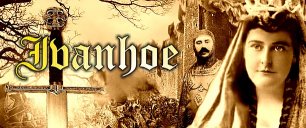 |
|
You are here:
An Account of the Composition and Production of Ivanhoe The early months of 1891 witnessed a very remarkable operatic experiment. New forces were at the back of it, and it was destined to mark the climax of the modern development of English opera. Had the scheme succeeded in its integrity, the operatic history of the next dozen years would have had to be rewritten; as it was, an individual artistic triumph was hampered by a Quixotic managerial policy, and the ambitious enterprise resulted in a regrettable failure. The late Richard D'Oyly Carte was a excellent man in his own sphere of action at the Savoy Theatre. He thoroughly understood the business of mounting the unique comic operas of Gilbert and Sullivan, and of sending them round the globe in the hands of well-trained companies. But about the organisation and management of serious opera he knew absolutely nothing. Shade of Carl Rosa! Imagine the fatuity of building a large and costly theatre on Shaftesbury Avenue, bestowing upon it the high-sounding title of the "Royal English Opera", engaging a double company, and opening with a repertory of - one work! Never was the initial error of placing the whole of the golden eggs in a single basket more surely followed by the destruction of the goose that laid them! Great was the faith of D'Oyly Carte in Arthur Sullivan. But not even the genius of that fine musician, as exemplified in his first grand opera Ivanhoe, was capable of withstanding so rude a test. Like one of the thoroughbred horses he loved so well, Ivanhoe ran a great race, achieved a "best on record", and then collapsed from sheer exhaustion. It has never raced since. Sullivan wrote "Ivanhoe", so to speak, with his life-blood. He slaved at it steadily from May till December, and put into it only his best. For weeks before he finished it he was inaccessible; the Christmas of 1890 was no holiday for him. The rehearsals had begun long before the orchestration was ready, and the opera was to be produced on January 31, 1891, at the latest. By the first week of the new year the score was completed. Then Sir Arthur told me I might come to Queen's Mansions to hear some of the music. To my great delight, he played several of the numbers for me. I found them picturesque, dramatic, original, and stamped throughout with the cachet which the world understands by the word "Sullivanesque". I was particularly struck by the Oriental character in Rebecca's song, "Lord of our chosen race", and I told Sullivan that nothing could be more distinctively Eastern or even Hebraic in type. "That may well be so," he rejoined. "The phrase on the words 'guard me' you especially refer to is not strictly mine. Let me tell you where I heard it. When I was the 'Mendelssohn scholar' and living in Leipsic, I went once or twice to the old Jewish synagogue, and among the many Eastern melodies chanted by the minister, this quaint progression in the minor occurred so frequently that I have never forgotten it." It certainly comes in appropriately here. The libretto of Ivanhoe was from the fluent pen of Julian Stugis, the author of Nadeshda. It won praise as a skilful and fairly dramatic adaptation of Scott's novel and a polished example of poetic lyric-writing. The work generally I described at the time as "one which rivets the attention of the spectator from the moment the curtain is raised; which is strong and sympathetic in action and picturesque in story; which is rich in melody and replete with musical interest and contrast; and which, finally, is presented with a perfection of executive detail such as English opera never enjoyed before". It was acclaimed with the utmost warmth by an audience which included the composer's ever-constant friends and patrons, the Prince and Princess of Wales, and the Duke and duchess of Edinburgh. The cast on the first night comprised Marguerite Macintyre (Rebecca), Esther Palliser (Rowena), Ben Davies (Ivanhoe), Norman Salmond (Richard Cœur de Lion), Ffrangcon Davies (Cedric), Charles Kenningham (De Bracy), Avon Saxon (Friar Tuck), Charles Copland (Isaac of York), and that gifted American barytone, Eugène Oudin, who made a brilliant début in the part of the Templar. The composer held the baton. The opera was at once scheduled "for a run", with two distinct casts, the alternative group including Miss Thudichum as Rebecca, Lucile Hill as Rowena, Franklin Clive as King Richard, Joseph O'Mara as Ivanhoe and Richard Green as the Templar. The strain of this test was marvellously borne. For no fewer than one hundred and sixty consecutive representations did Ivanhoe draw large and enthusiastic audiences - far and away the longest unbroken run ever accomplished by a serious opera. Then, at the end of July, it was withdrawn, and the house closed until November, when an English version of André Messager's successful comic opera La Basoche was brought out. This did fairly well, but it is noteworthy to-day only from the fact that it enabled Mr. David Bispham, by his clever singing and acting, to make a deep impression at his first appearance upon the London stage. D'Oyly Carte now doubtless imagined that he possessed the foundation of a repertory, and he revived Ivanhoe to run alternately with La Basoche - Barton Mc Guckin filling the title-rôle while Medora Henson was the Rowena. But the public quickly undeceived the too sanguine manager. It stayed severely away. The drawing power of Sullivan's beautiful opera had been exhausted; and on January 16, just a fortnight short of twelve months after its auspicious opening, the Royal English Opera was finally closed - the strangest comingling of success and failure ever chronicled in the history of British lyric enterprise! Page updated September 25, 2021
|
